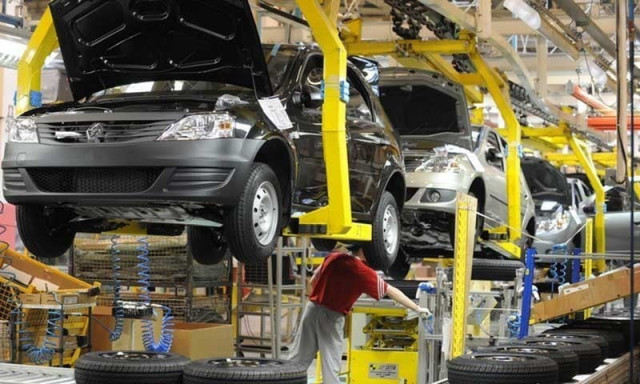Auto industry flexing muscles for price hike
Increase in raw material prices, cost of shipping goods will lead to rise in automobiles prices

Recently Pakistan, among other countries, has reported soaring prices of automobiles rooting from the increased prices of raw materials. This problem is not only limited to raw materials such as steel and plastic but has also translated into skyrocketing cost of shipping goods.
Something as basic as a 40-foot container of commodities being transported by sea from Asia to Europe currently costs more than $10,500, a whopping increase of 547% on average in the past five years.
“No doubt raw materials are short and soaring,” said Pakistan Association of Automotive Parts and Accessories Manufacturers (PAAPAM) Chairman Abdul Rehman Aizaz while talking to The Express Tribune.
The latest increase in steel, cold-rolled coil (CRC), price per kilogram jumped Rs93 to around Rs240, periodically, during January 2020 to July 2021, he said.
Rising freight costs are impacting the price of everything from furniture and vehicle parts to basic staples, exacerbating concerns in global markets. A host of reasons, including rising demand, container scarcity, overburdened ports, and a shortage of ships and dock personnel, have all contributed to the tightening of transportation capacity on all freight routes. Covid outbreaks in export centres across the globe have amplified the problem.
Shipping expenses, which were often disregarded as having little influence on inflation since they were such a small proportion of the entire cost, are now compelling some economists to give them more attention. Many industries are trying to work around these costs which are eating up their profit margins and pulling them far away from breaking even. Some companies have ceased exporting to certain countries, while others are seeking commodities or raw materials in closer areas.
“It is very important that foreign exchange should be controlled,” said auto expert Mashood Ali Khan. “Within one month, we have seen increase in the US dollar. On July 1, 2021 one US dollar was available at Rs158.09 in the inter-bank market and on August 6 the greenback was available at Rs163.45.
The analyst warned that if the same trend continues in coming months then it will be difficult to control prices. “Container prices surged by almost 10% in different countries and delay in shipments also continued, which added to the misery,” he said.
Read Finance minister reviews auto policy draft
These freight costs when narrowed down on a local level relate closely to the increase in prices of steel hence affecting the costs of containers, automobiles, vehicles, etc. The increase in local steel prices is directly connected to the increase in prices internationally, which has coincided with resurgence in global demand following the vaccination campaign and continued port bottleneck difficulties, particularly in South Asia.
While the former is a key influence in raising local pricing, the latter is also proving to be a significant impact, as it is harming steel imports, allowing parties involved to shift these costs to consumers. In an effort to raise bar costs, several steel bar producers stopped receiving new booking orders from builders in the beginning of summer season.
Steel bar prices increased by Rs5,000 per ton to Rs142,500-178,500 per ton in mid-May, citing an unexpected increase in international scrap costs. This has also put the government of Pakistan’s house-building schemes along with other attempts to flourish consumer industries in jeopardy.
“The auto companies will have to increase car prices in the next few months,” said AHL analyst Arsalan Hanif. Circling back to the point made earlier, price of steel, as well as freight, has started impacting the automobile industry.
Steel prices reaching new highs will have an impact on automakers in the next months, as most of them will have to raise product pricing twice over a small span of time to maintain their operating margins, at a time when car demand is gradually rebounding.
The car industry’s expansion is being hampered by a sharp and unprecedented spike in raw material prices. Automobile manufacturers are under cost pressure, which will probably force them to pass the cost on to customers. Prices in the Pakistani motorcycle industry are already on a rise.
Khan added that earlier last week, a Japanese company said it will suspend its production line at Toyota Auto Body’s Fujimatsu plant in the prefecture for five days from July 29 “due to parts shortage resulting from the spread of Covid-19 in Southeast Asia”. The local automobile companies that will be affected by this the most are the ones who have emerged after the Auto-policy 2016-21. Apart from the rise in the cost of raw materials, the mobility of shipping containers in and through South Asian countries is a major factor contributing to this pressure.
Therefore, it is interesting to note that even though the government took commendable initiatives to boost the automotive industry which included relaxation in taxes and duties, and Rs36 billion subsidy for 10 years for the construction industry, it is expected that these attempts will go in vain.
“Due to international auto parts manufacturer plants shut down in Vietnam and Indonesia as well these effects will come in our market too; the government must focus on exchange rates otherwise prices will increase very soon,” Khan vocalised.
Published in The Express Tribune, August 8th, 2021.
Like Business on Facebook, follow @TribuneBiz on Twitter to stay informed and join in the conversation.


1733130350-0/Untitled-design-(76)1733130350-0-208x130.webp)
















COMMENTS
Comments are moderated and generally will be posted if they are on-topic and not abusive.
For more information, please see our Comments FAQ